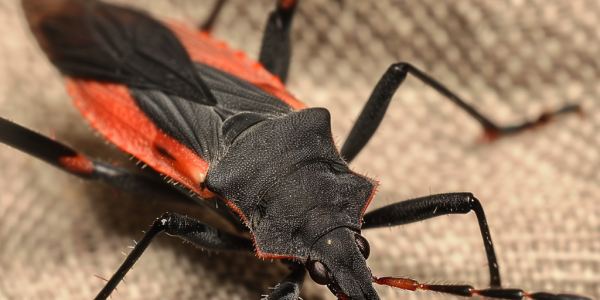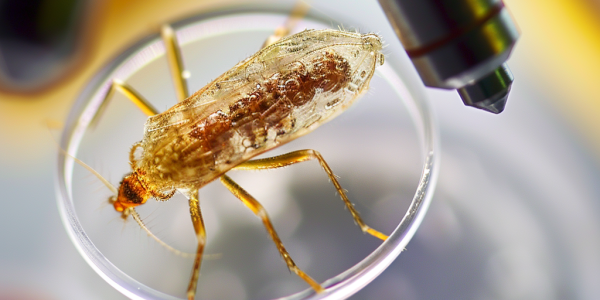Breakthrough Study Unlocks Potential to Combat Malaria Drug Resistance
Researchers at UC San Diego have made a breakthrough in malaria treatment by analyzing the genomes of malaria parasites. This study, published in Science, identifies genetic variants linked to drug resistance, paving the way for more effective therapies and improved predictions of treatment outcomes. As malaria remains a critical global health issue, these findings offer hope for controlling and potentially eradicating the disease.
Texas Woman Faces Blindness After Rare Eye Infection from Swimming with Contact Lenses
A 23-year-old Texas woman, Brooklyn McCasland, faces severe complications, including blindness, after contracting acanthamoeba keratitis, a rare parasitic eye infection linked to swimming with contact lenses. Her story emphasizes the critical need for contact lens wearers to follow safety guidelines to prevent infections and protect their eye health.
Deadly ‘Kissing Bugs’ Found in Delaware for the First Time
Scientists in Delaware have made a concerning discovery as ‘kissing bugs’ carrying a deadly parasite have been found in the state for the first time. These insects, known for transmitting Chagas disease, have raised alarm among researchers. The discovery of Triatoma sanguisuga bugs carrying the parasite Trypanosoma cruzi in New Castle County highlights the need for vigilance and further research to prevent potential health threats.
Study Finds Cryptosporidium in Pre-Washed Vegetables Sold in Kent
A recent study by University of Kent scientists found cryptosporidium, a waterborne disease, in pre-washed vegetables in Kent. The research highlights the need to review sanitation methods and emphasizes consumer awareness on proper storage and handwashing. Cryptosporidium, resistant to chlorine disinfection, can cause symptoms like diarrhea and vomiting. Suppliers are urged to enhance hygiene measures to reduce contamination risk.
Ancient Plasmodium Genomes Shed Light on History of Human Malaria
Ancient Plasmodium genomes shed new light on the history of human malaria, revealing insights into the origins and spread of the disease. The study utilized high-coverage ancient genome-wide data spanning 5,500 years, showing early presence of P. vivax and P. falciparum in Eurasia. European colonizers likely brought P. vivax to the Americas, while the slave trade introduced P. falciparum. Surprisingly, P. falciparum was found in the high-altitude Himalayas, challenging previous assumptions. This research paves the way for palaeo-epidemiological studies, offering valuable insights into the historical impact of Plasmodium parasites.
New Mechanism Behind Malaria Parasite Drug Resistance Discovered
Researchers have identified a new mechanism behind the development of resistance to the antimalarial drug artemisinin. The study focused on tRNA modification, shedding light on how malaria parasites evolve resistance and opening up possibilities for innovative drug development. With millions of cases and hundreds of thousands of deaths reported annually, the emergence of resistance poses a significant challenge in combating malaria.
Six People Diagnosed with Trichinellosis After Consuming Black Bear Meat Kebabs
Six people in the US diagnosed with trichinellosis after consuming black bear meat kebabs. CDC report reveals details of the incident, emphasizing the importance of thorough cooking to prevent parasitic infection. Analysis shows freeze-resistant trichinella nativa larvae in the contaminated meat.
Researchers Discover Promising Compounds for Treating Parasitic Worm Infections
An international team of researchers led by the University of Toronto has discovered a family of natural compounds with potential as potent treatments for parasitic worms, offering hope for over one billion people affected by these infections. The study, published in Nature Communications, focused on targeting a molecule essential for the parasite’s survival while sparing the human host. This groundbreaking research highlights the urgent need for innovative anthelmintic drugs to combat drug-resistant parasites and offers promising avenues for developing more effective therapies.
Groundbreaking Discovery: Giant Virus Infects Amoeboflagellate Naegleria
Researchers have isolated a giant virus, Catovirus naegleriensis, infecting the amoeboflagellate Naegleria, shedding light on its unique adaptations. The study, published in Nature Communications, delves into the structure and infection cycle of this newly identified giant virus, providing insights into the interactions with its host and expanding the understanding of giant viruses.
New Insight into Genetic Diversity of Deadly Malaria Parasite
Scientists have made a groundbreaking discovery in understanding the genetic diversity of the deadly malaria parasite, Plasmodium falciparum. This insight is crucial for developing effective vaccines against malaria, a life-threatening infectious disease that claims millions of lives globally. The study sheds light on non-allelic gene conversion, revealing a previously underestimated evolutionary mechanism that could inform innovative strategies for tackling the disease.










